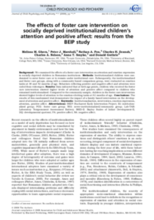Background: The study examined the effects of a foster care intervention on attention and emotion expression in socially deprived children in Romanian institutions.
Methods: Institutionalized children were randomized to enter foster care or to remain under institutional care. Subsequently, the institutionalized and foster care groups, along with a community-based comparison group, were evaluated on emotion tasks at 30 and 42 months of age. Behaviors reflecting positive and negative affect and attention were coded from videotapes.
Results: Data indicated that at both age points, children who received the foster care intervention showed higher levels of attention and positive affect compared to children who remained institutionalized. Compared to the community sample, children in the foster care intervention showed higher levels of attention to the emotion-eliciting tasks at 42 months of age.
Conclusions: The results of this randomized trial demonstrate the impact of a family-based intervention on the development of attention and positive affect. The current study illustrates the efficacy of a family-based foster care intervention in producing change in the expression of emotion and attention for previously institutionalized children. After a relatively short period of intervention, children who had been removed from institutions displayed heightened positive affect and attention to two positively valenced laboratory episodes. The FCG demonstrated significantly more joy than the IG at both 30 and 42 months. In fact, not only did FCG children display higher mean values at each time point, but the change for these children from the baseline assessment was significantly more marked than that of the IG. The rapid nature of the change in positive affect expression is encouraging and demonstrates the responsiveness of emotion behavior systems to intervention, even following significant early social deprivation.
©Journal of Child Psychology and Psychiatry

